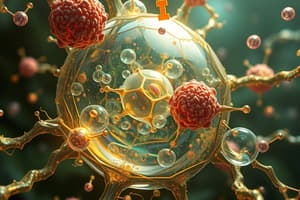Podcast
Questions and Answers
What is the primary function of proteins in a cell?
What is the primary function of proteins in a cell?
- Energy storage
- Structural support
- Genetic information transfer
- Cellular communication (correct)
Which biomolecule is essential for the formation of cell membranes?
Which biomolecule is essential for the formation of cell membranes?
- Proteins
- Nucleic acids
- Carbohydrates
- Lipids (correct)
What is the process responsible for cellular reproduction?
What is the process responsible for cellular reproduction?
- Glycolysis
- Mitosis (correct)
- Protein synthesis
- Photosynthesis
Which organelle is responsible for energy production in a cell?
Which organelle is responsible for energy production in a cell?
What is the primary function of carbohydrates in cells?
What is the primary function of carbohydrates in cells?
Which type of cell division is responsible for gamete formation?
Which type of cell division is responsible for gamete formation?
What is the main focus of human physiology?
What is the main focus of human physiology?
Which system is responsible for transporting blood, nutrients, and waste products throughout the human body?
Which system is responsible for transporting blood, nutrients, and waste products throughout the human body?
In plant physiology, what process is associated with the exchange of gases such as oxygen and carbon dioxide?
In plant physiology, what process is associated with the exchange of gases such as oxygen and carbon dioxide?
What is the main focus of genetics?
What is the main focus of genetics?
Which field focuses on the study of processes like photosynthesis and plant responses to environmental factors?
Which field focuses on the study of processes like photosynthesis and plant responses to environmental factors?
What drives the process of evolution in living organisms?
What drives the process of evolution in living organisms?
Flashcards are hidden until you start studying
Study Notes
Exploring Biology's Foundations: Cell Structure and Function, Biomolecules, Physiology, and Genetics
Cells, the basic units of life, are a captivating topic at the heart of biology. Their structure and function form the foundation for understanding biochemistry, physiology, and genetics—all essential fields of biology.
Cell Structure and Function
Cells consist of various structures, including the nucleus, mitochondria, endoplasmic reticulum, and cell membrane. These structures enable cells to carry out essential functions, such as energy production, protein synthesis, and cell signaling.
A cell's life cycle is divided into stages, including mitosis (cell division) and meiosis (gamete formation), each essential for cellular reproduction and the continuity of life.
Biomolecules
Biomolecules, such as proteins, lipids, carbohydrates, and nucleic acids, are the building blocks of life. These molecules serve diverse functions, including energy storage, cellular communication, and genetic information transfer.
Proteins, composed of amino acids, are crucial for biological functions, such as enzymatic reactions, structural support, and cell signaling. The study of proteins, known as proteomics, has advanced our understanding of complex biological processes.
Lipids, such as fats and phospholipids, are essential for energy storage and the formation of cell membranes. Carbohydrates serve as energy sources and structural components.
Human Physiology
Human physiology is the study of the functions of living organisms and their parts. This field encompasses various biological systems, including the cardiovascular, respiratory, nervous, and endocrine systems.
The respiratory system facilitates oxygen uptake and carbon dioxide release, while the cardiovascular system transports blood, nutrients, and waste products throughout the body. The nervous system controls body functions and senses the environment, and the endocrine system regulates hormone production and release.
Plant Physiology
Plant physiology investigates the functional aspects of plant life. This field focuses on processes such as photosynthesis, transpiration, and respiration. Plant physiology also encompasses the study of plant growth, development, and responses to environmental factors.
Genetics and Evolution
Genetics is the study of the hereditary information that organisms inherit from their parents. DNA, the genetic material, carries this information, which is encoded in the form of genes. Genetics also focuses on the transmission of genetic information from one generation to another and the expression of genes in various environments.
Evolution is the process by which populations of living organisms change over time. This process is driven by genetic variation and natural selection, resulting in adaptation to changing environments and the development of new species.
Conclusion
Biology's diverse fields provide a comprehensive understanding of life and its processes. By investigating cell structure and function, biomolecules, physiology, and genetics, we delve deeper into the intricate workings of biology and the natural world. The exploration of these fields has extensive implications for our understanding of human health, plant biology, and the evolution of life.
Studying That Suits You
Use AI to generate personalized quizzes and flashcards to suit your learning preferences.




